|
|
|
|
See Explanation of the Crops Key for criteria. Click on a photo to see a larger version.
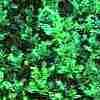
|
Amaranth |
Organic amaranth can be found at natural food stores and co-ops. I planted a patch of seeds in late April, 2001. The plants did well at first but were done in by insects and heat and/or dryness. Planted one year only. |
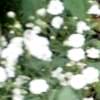
|
Baby's Breath |
Planted from seed in 2005. The latin designation is Elegans alba grandiflora. Planted one year only. |
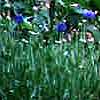
|
Bachelor's Button |
This is blue Bachelor's Button, also known as Cornflower. It was part of a "flowers of Monet" package I planted in 2002. Pretty and maintenance-free. Planted one year only. |
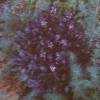
|
Basil, Dark Opal |
I purchased two plants from an herb fair in 2004. The one in a pot on my porch died, but the one in the garden performed excellently. Planted one year only. |
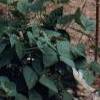
|
Beans, Black |
Started in 1999 from a handful of seeds from a one-pound bag of Jack Rabbit brand beans. Estimated cost: about a nickel. Plant date: mid-March to early April seems to be a good gamble. If picked quickly enough, young beans can be eaten as snap beans, but they soon become stringy. After the late summer heat dries the beans out, the dry beans can be harvested and stored for replanting the following spring. The 2001 plants were the third generation of the original seeds, but rodents and poor weather patterns prevented the new seeds from drying. Planted 1999-2001. • Wide row as inspired by Dick Raymond's Joy of Gardening |
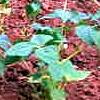
|
Beans, Navy |
These were planted from packages purchased at the grocery store for less than $1.00 a pound. I tried some test plants in 1999 and then a full wide row in 2002. They'd do fine except for one thing: rodents! The durn beasts love the tender leaves, leaving the young stalks bare-leafed. The plants do survive and produce a few beans but remain very small so the quantity of beans is very low. Planted 1999, 2002. |
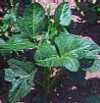
|
Black-Eyed Peas |
1999's crop was planted rather late in the year, plus was outside the fenced security zone. The 2000 crop produced moderately well, but the dried beans rotted over the winter. The 2001 crop produced only a couple of plants. The 2004 crop was excellent; the 2005 crop is pathetic. Planted 1999-2001, 2003-2005. |
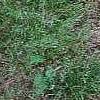
|
Carrots |
Germination is both low and slow. Planted 1999-2000, 2005. |
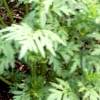
|
Cosmos |
Planted from organic seed in 2005, these are Mona's Orange Cosmos. Flowered after photos were taken. Planted one year only. |
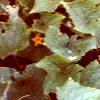
|
Cucumbers |
First planted in 2004, this is so far my single most successful food-producing crop. From an estimated twelve seeds planted, nine plants came up. As of July 4, 2004, I'd picked 35 cucumbers; by August 4 that number was up to 98. The variety is Sweet Marketmore (Cucumis sativus). It should be noted that this was the first time I planted seeds directly in decomposed leaf mulch. It also happened to be an excellent year weather-wise, with a balanced mixture of rain and sun. In 2005, I again planted twelve seeds, of which two came up. However, the seeds were from the same packet as the year before. Seven fruits picked so far. Planted 2004-2005. |
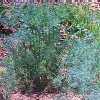
|
Dill |
A dependable, tasty herb. Each year new plants grow from the previous year's seeds, without any intervention on my part. Planted (or self-propagated) 1999-2005. |
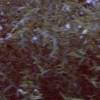
|
Flax |
This was my experimental crop for 2004, using organic seeds purchased from a natural foods store. The plants are thin and grow to a height of about 24-30 inches, with small bluish flowers followed by seed pods. Heavy rainfall knocks the plants over. Planted one year only. |
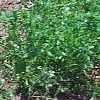
|
Lentils |
1999's crop was planted rather late in the year, plus was outside the fenced security zone. The 2000 crop did well as far as plant growth, with blossoms forming in the beginning of June. However, since lentils produce only one bean per pod and most of the pods mysteriously disappeared, the crop was far from being practical as far as food production is concerned. Planted 1999-2000. |

|
Marigolds, Double Pinwheel |
I planted organic seeds of the variety Tagates patula in 2004. The plants that came up were very healthy but foliage-heavy with few flowers. Planted one year only. |
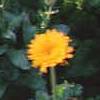
|
Marigolds, English |
English Marigold seeds were part of a five-tin "flowers of Monet" package. May be mis-identified. The photo seen here was snapped in June 2002. No care other than weeding was required. Planted one year only. |
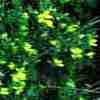
|
Mustard |
The mustard seeds I planted in the fall of 2000 produced a full crop of mustard greens. Roughly half of the plants survived the winter and went into blossom in the spring of 2001. The greens are too spicy for me to enjoy raw, but they work well in lentil soup. Planted one year only. |

|
Peppers, Green |
In 1999, only 3 plants made it to fruit production from an entire packet of seeds. In 2000, again from one packet planted, only one plant appeared. 2003 yielded zero plants! The 2005 plants never made it to fruit production. Planted 1999-2000, 2003, 2005. |
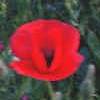
|
Poppies, Seine Valley |
Poppy seeds were part of a five-tin "flowers of Monet" package. The photo seen here was snapped in June 2002. No care other than weeding was required. Planted in 2002 only; self-propagated 2003-2004. |
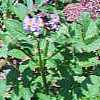
|
Potatoes |
What I thought were weeds turned out to be potatoes, apparently growing from roots left behind from the previous plot-leaser. In 2000, I was able to dig up a potful's worth of tubers. The stalks that arose from the soil in 2001 were killed by a late frost. Never planted; plants 2000-2001. |

|
Radish |
I planted radish seeds in the fall of 2000. The plants came up but were completely decimated by rodents (it turned out that the fenced "security zone" wasn't so secure). Planted one year only. |

|
Ryegrass, Annual |
Annual ryegrass makes a nice "green mulch" that protects the soil over the winter months. Seeds planted in the fall dependably sprout plants each year; I turn the grass into the soil during March and April. No grass remains for the annual June photo-shoot! Planted 1999-2003. |
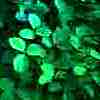
|
Soybeans |
I purchased some bulk organic soybeans from a natural food store and planted them in April, 2001. Plants came up at the beginning of May. They did extremely well until the groundhogs decided to have a feast and make a new home. Planted one year only. |

|
Spinach |
I planted organic America Spinach (Spinacea oleracea) in fall 2003. The plants survived the winter, and I started picking in spring 2004. By mid-June the plants had bolted and were no longer any good for eating. Fall 2004 and spring 2005 plantings never came up. Planted 2003-2005. |

|
Sweet Potatoes |
One of my plot neighbors gave me some of his extra starter roots in 2001. The plants survived the summer for the most part but the roots failed to swell significantly. Planted one year only. |
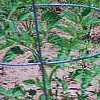
|
Tomatoes |
Planting seeds directly into the ground, I've had lousy luck -- two plants per seed packet is par for the course. A handful of the previous year's offspring will sprout of their own accord each year. All of these plants-from-seed come up too late in the spring to have high levels of productivity. In recent years I've purchased plants in May; these grow vigorously but I've had trouble with cages being too small and falling over. Bottom line: I get tomatoes, just not a tremendous quantity. Planted 1999-2005. |
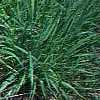
|
Wheat |
At 49¢ a pound at a local natural food store, wheat is so cheap, I figured, "why not try wheat as a cover crop in place of annual ryegrass?" I planted the wheat berries in April, 2000; the wheat grew (it looks like grass) but failed to reach seed production as far as I could tell (lots of things look like grass). Planted one year only. |
This page hosted by ![]() Get your own Free Home Page
Get your own Free Home Page
Last updated July 8, 2005 by Colt Mazeau